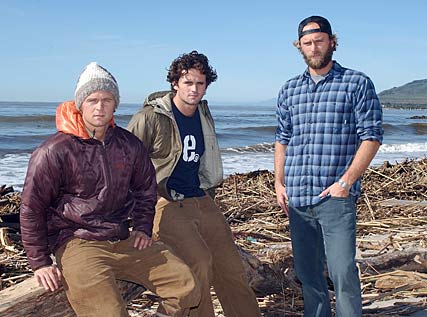
|
Surfers rush
to aid victims at
world-famous breaks
Coastlines ravaged by the
tsunami included reefs renowned
on the wave-riding map
Surf contest to
|
Now, the bond that surfers feel with those remote villages has prompted many to dig deep into their board shorts to raise money for victims of the catastrophe.
"Almost all the main places that were hit are places where we've been and met people," said Keith Malloy, a Southern California surfer who helped organize a fund-raiser last week that generated about $14,000. "It kind of hit home for us."
One organization, SurfAid International, which ran a health program in Indonesia's Mentawai islands even before the disaster, has collected more than $500,000 -- a figure expected to grow after a trade show this weekend. SurfAid has used the donations to dispatch a medical team to the Indonesian island of Nias, a renowned surfing spot where the tsunami killed at least 340 people and left 10,000 homeless.
"There is a feeling that surfers get so much enjoyment when they go down there, and now is a good time to put something back in," said Sean O'Brien, editor in chief of TransWorld Business, a trade magazine in Oceanside that covers the surf industry.
The Dec. 26 quake and tsunami hit a region that forms part of a far-flung surfing circuit. When the disaster struck in the Indian Ocean, the world's surfers were among the few to have firsthand knowledge of places that many people cannot even pronounce. Appeals for aid quickly spread by e-mail and on surfing Web sites.
"There has been a groundswell of support from the surfing community beyond anything I could have imagined," said Robert Gerard, a Laguna Beach lawyer who is chairman of SurfAid's board of directors. The group was founded in New Zealand in 2000 and has its U.S. office in Encinitas.
Malloy, a professional surfer from Ventura, helped organize the fund-raiser, which included a silent auction of surfboards donated by local shops.
"We've had some of the best times of our life there," he said. "It's a special place."
Because SurfAid was already active in Indonesia, it has become a conduit for disaster relief. The group has collected between $500,000 and $750,000 in money and in-kind contributions from individuals, surf-wear companies such as Quiksilver and Billabong, and the government of New Zealand, Gerard said.
The total is expected to grow after this weekend's Action Sports Retailer convention in San Diego, where industry groups plan to sell black bracelets made of neoprene -- a material used for wet suits -- to raise money for tsunami victims. Organizers hope to make the bracelets available at surf shops and on the Internet.
www.surfaidinternational.org/work/work.html
East-West Center Tsunami Relief page
www.eastwestcenter.org/events-en-detail.asp?news_ID=252
American Red Cross Hawaii
www.hawaiiredcross.org/
Red Cross survivor locator
www.familylinks.icrc.org
Pacific Tsunami Warning Center
www.prh.noaa.gov/ptwc/
U.S. Pacific Command
www.pacom.mil/
[News] [Business] [Features] [Sports] [Editorial] [Do It Electric!]
[Classified Ads] [Search] [Subscribe] [Info] [Letter to Editor]
[Feedback]
